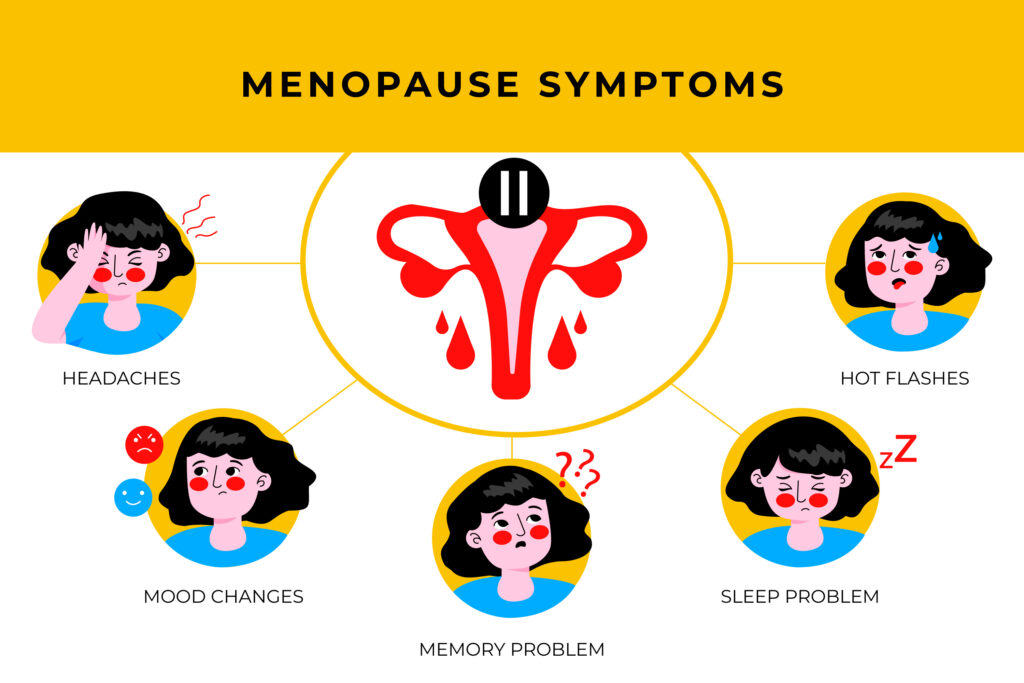
Navigating menopause is a significant life transition for women, typically occurring in their late 40s to early 50s. Menopause marks the end of the reproductive years and involves various physical and emotional changes. Here’s what to expect during menopause and some coping strategies:

Navigating menopause: What to expect
- Menstrual Changes: Menopause is defined as the absence of menstruation for 12 consecutive months. You may experience irregular periods or changes in menstrual flow leading up to menopause (perimenopause).
- Hot Flashes and Night Sweats: Many women experience hot flashes, which are sudden sensations of heat, often accompanied by sweating and a flushed face. These can be frequent and disruptive.
- Vaginal Changes: Vaginal dryness, itching, and discomfort can occur due to hormonal changes. This can lead to pain during intercourse.
- Mood Changes: Hormonal fluctuations can contribute to mood swings, irritability, and increased vulnerability to conditions like anxiety and depression.
- Sleep Disturbances: Changes in hormone levels can disrupt sleep patterns, leading to insomnia or frequent awakenings.
- Bone Health: Postmenopausal women are at an increased risk of osteoporosis due to a decrease in estrogen levels. This can lead to bone density loss and an increased risk of fractures.
- Weight Changes: Some women may experience weight gain or changes in body composition during menopause.
- Heart Health: A decline in estrogen levels can impact cardiovascular health, increasing the risk of heart disease.

Navigating menopause: How to cope
- Education: Understanding the physical and emotional changes associated with menopause is the first step in coping. Speak with a healthcare provider or seek reputable sources for information.
- Lifestyle Modifications:
1. Maintain a balanced diet rich in calcium and vitamin D for bone health.
2. Engage in regular physical activity to support overall well-being.
3. Manage stress through relaxation techniques, meditation, or yoga.- Hormone Therapy: Discuss hormone replacement therapy (HRT) options with a healthcare provider. HRT can alleviate some menopausal symptoms but comes with potential risks, so decisions should be individualized.
- Vaginal Health: Over-the-counter or prescription treatments are available for vaginal dryness. Discuss options with a healthcare provider.
- Cooling Strategies: Dress in layers, keep your bedroom cool, and use fans to manage hot flashes.
- Support: Share your experiences and concerns with friends, family, or a support group. You’re not alone in going through menopause.
- Medications: In some cases, medication may be prescribed to manage specific symptoms like mood changes or sleep disturbances.
- Regular Check-ups: Continue to see your healthcare provider for routine check-ups and screenings, especially for heart and bone health.
- Sexual Health: Open communication with your partner about changes in sexual desire and function is essential. Experiment with lubricants or consider counseling if needed.
Remember that menopause is a natural phase of life, and while it can bring challenges, it can also lead to newfound freedom from menstrual cycles and contraception concerns. Approach this transition with self-compassion and a proactive attitude towards your health and well-being. If you find that menopausal symptoms are significantly impacting your quality of life, consult with a healthcare provider for personalized guidance and treatment options.
